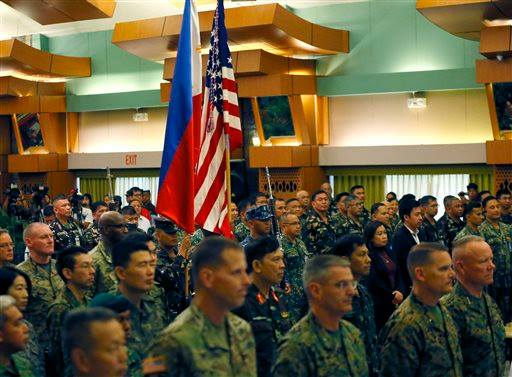
U.S. and Philippine military officers stand at attention during the entrance of the colors at the opening ceremony of the annual joint U.S.-Philippines military exercise dubbed Balikatan 2016 (Shoulder-to-Shoulder) Monday, April 4, 2016 at Camp Aguinaldo, in suburban Quezon city, northeast of Manila, Philippines. The annual military drill, involving 5,000 U.S. personnel and 3,500 counterpart from the Philippines, is being conducted amidst tension in the South China Sea. AP Photo/Bullit Marquez, file
Despite his harsh criticisms against the US, President Rodrigo Duterte is not about to cut ties with Washington as he stressed that the Philippines should not be lectured upon by any country or foreign head of state.
“We are not going to cut our umbilical cord with the countries we are allied with,” Duterte said during the 48th anniversary of the Air Force's 250th Presidential Airlift Wing in Villamor Airbase in Pasay City on Tuesday.
“We are not cutting our alliances. (We are not cutting) military (alliances) as well. But, certainly, we will follow an independent posture and independent foreign policy,” he added.
Duterte issued the statement a day after he called for the withdrawal of US troops in Mindanao to avoid escalating security risks in the area. According to him, members of the terrorist group Abu Sayyaf hate the US so much that they are ready to abduct and kill any American they see.
Duterte, who has scored the US for allegedly meddling with his bloody war against illegal drugs, said he would not allow other countries to dictate on the Philippines under his watch.
“With regard to drugs, I’ve been in the receiving end (of criticisms). You know that. It could be funny to look at… You know, we could never be just a small country (that can be) shouted at or lectured upon by any foreign country or by any president,” the president said.
“As I said, in my quest for what is right for my country, I’m putting on the table at stake my honor, my life and the presidency,” he added.
The US has repeatedly spoken against the spate of killings and the alleged human rights violations in the Philippines, something that Duterte has viewed as an interference into the country’s internal affairs.
The acid-tongued Duterte believes that the US cannot preach about human rights because it is also guilty of atrocities like the massacre of about 1,000 Moros in Bud Dajo in Jolo in 1906. He also pointed out in previous speeches that the US has a mess to clean up in its own backyard such as the killing of black Americans by American policemen.
“(If we) have to address human rights problems, then we have to discuss the entire gamut and dimension,” Duterte said.
Abella said the Bud Dajo massacre is a “lingering skeleton” that “removes moral ascendancy of those criticizing the Philippines for killings.”
He (Duterte) is uncovering something that has not been addressed,” he added.
Duterte cited the killing of male Filipinos aged ten and above in Balangiga, Samar in 1901 and the stealing of the town’s church bells that are still under US control until now.
“They got the bell. Until now, they hijacked it, stole it never returned it to us,” Duterte said.
'Not yet a policy'
Malacañang on Tuesday sought to play down President Duterte’s statement that he wants American troops out of Mindanao, saying it is not yet a policy and does not indicate that the Philippines is turning its back on its alliance with the US.
Presidential spokesman Ernesto Abella said the president merely issued an “injunction” and a “warning” about the risks being faced by Americans in Mindanao.
"Those statements are not policies set in stone," Abella said in a press briefing.
“These are backgrounders for possible future action. There’s a difference,” he added.
Abella admitted though that Duterte’s remarks were “layered” and could be interpreted in several ways.
“It serves as notice. That really, the reason why there’s trouble here is because of that presence (of the US troops),” he said.
When reminded that every statement of the president is perceived as a policy, Abella replied: “It's not automatically policy but it is a basis of policy.”
Despite Duterte’s remarks, Abella said the Philippines would continue to honor agreements like the Enhanced Defense Cooperation Agreement (EDCA) and the Visiting Forces Agreement (VFA).
EDCA grants the US access to some Philippine bases while VFA allows American troops to hold joint exercises with Filipino soldiers on Philippine soil.
“We're not turning [our] back on anybody. We are just charting an independent course,” the presidential spokesman said.
Some US servicemen have been sent to Zamboanga City to help Philippine troops track down terrorist groups. Their role is limited to training and information sharing because the 1987 Constitution bars foreign troops from joining combat operations.
There are less than 200 American soldiers in Mindanao, according to a ranking military official.

No comments:
Post a Comment
Note: Only a member of this blog may post a comment.